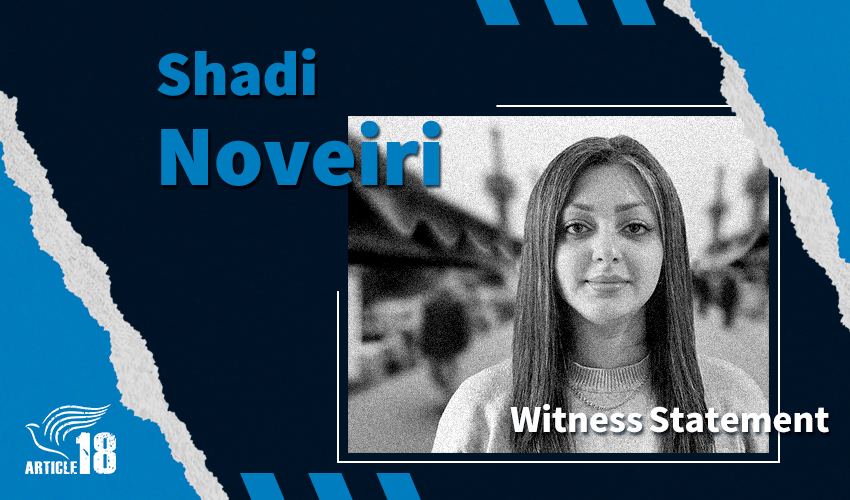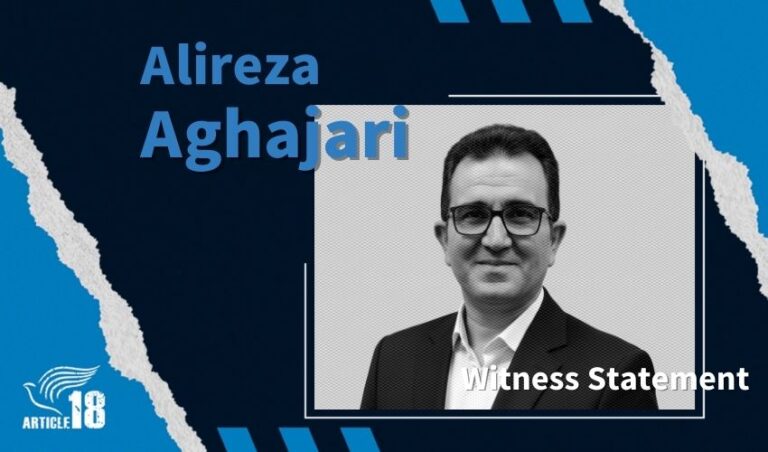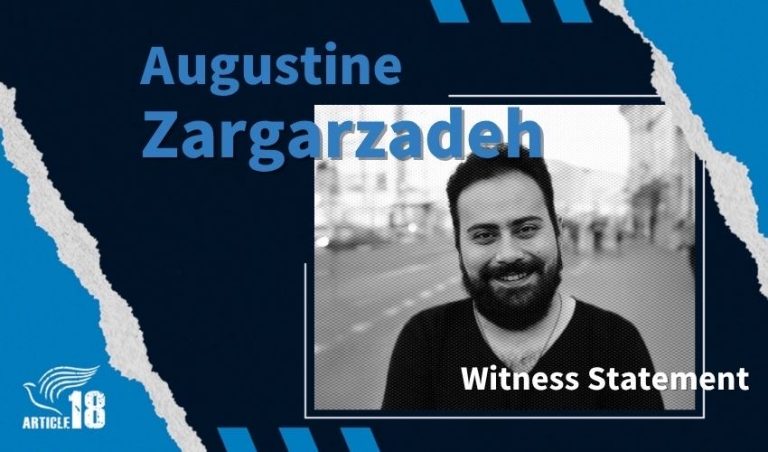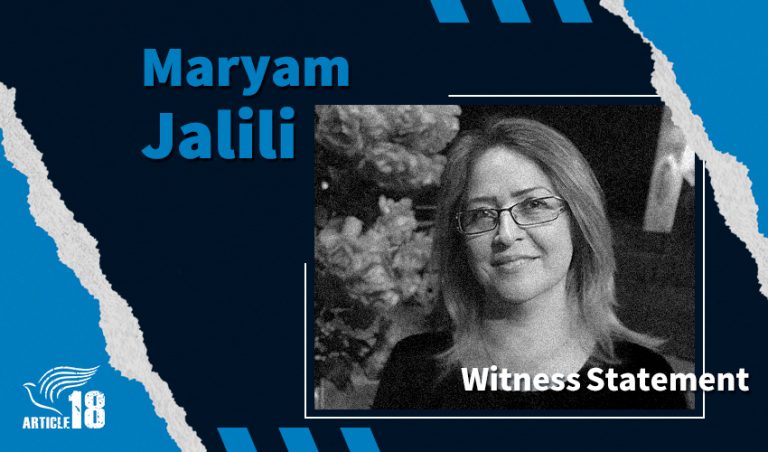For a summary of Shadi’s story, you can read our feature article here.

Introduction
1. My name is Shadi Noveiri Gilani. After becoming a Christian, I was known by two names: Sheilan and Raha. I was born in Bandar Anzali [in Gilan Province, north Iran] in 1990 and grew up there. I was the first child in my family, and I have one brother.
2. My mother used to watch the programmes of the Christian satellite TV channel Mohabat, and talked to me about Christianity, but I disagreed with what she said. Just before my 17th birthday, one night my mother asked me to call the Mohabat network and request for them to send her a Bible. I called Mohabat’s hotline numbers one after another until, after some time, the call was connected and I requested a Bible for my mother. The person on the other side of the line also prayed for me and my insomnia problem. I didn’t know much about Christianity, but I prayed with all my heart and experienced a profound inner transformation. It was in this way that I became a Christian, on 19 September 2007, and I was baptised in April 2008 in [the adjacent province of] Mazandaran.
House-church
3. A few days later, I called the same person from Mohabat and asked for a Bible, and said that I would like to join a house-church. I was then introduced to a Christian couple who were known as Sam and Sara. They lived in Tehran, but they connected me to one of their house-churches in Bandar Anzali.
4. After six months in the group, I started engaging in Christian activities. I used to visit different groups connected to our house-church in the villages and cities of Gilan Province. Gradually, I began to teach at the house-church meetings and became responsible for organising meetings in Gilan Province. The responsibility of facilitating, coordinating and finding a suitable place for conferences inside Iran was another of my activities. A few dozen Christians were present at each of these conferences. In addition, I had one-on-one time with church members to strengthen their faith and answer their questions.
5. In 2012, I met a church member named Maryam, and after that we started to work together. Maryam studied architecture, and I had a degree in accounting. We had an office, and for about a year we helped students with their architecture projects, such as making models. After some time, one of our friends gave us a section of his office and we continued our work there. Then we rented another office in a commercial complex, and worked independently. In addition to the services we provided for students, we were the exclusive representative of a Hungarian brand for waterproof products – Isogum – and were responsible for executing orders.
Arrest
6. Once or twice a month, we had a meeting in Tehran or Karaj with others involved in Christian activities in house-churches that were under the supervision of Sam and Sara. Around two days before one of those meetings, which was scheduled to take place in November 2015, my colleague Maryam and I went to stay at her father’s house in Karaj.
7. But on Wednesday 11 November, 2015, between 8.30 and 9am, four or five male officers and one female officer entered Maryam’s father’s house. The officers said to Maryam and me: “Get dressed, we have to go.” I said: “Where? You have to show a warrant first.” They showed us a warrant, which only had Maryam’s name on it, but they arrested both of us and took us away.
8. We didn’t know that the previous night, all the members of our house-churches in Tehran, Karaj, and Qazvin had been arrested. Later, we heard from the manager of our apartment block in Bandar Anzali that the night before we were arrested, three male agents had entered our apartment at 11pm. They had broken down the door and entered the apartment, searched the whole place in a very rough way, and messed up the furniture. They confiscated several SIM cards, with which we used to contact the church members and inform them about the dates of teaching sessions, as well as Christian pamphlets, documents related to our studies at the Pars School of Theology [in the UK], about four Bibles, a guitar, music books of Christian songs, prayer books, and they also confiscated my personal letters that I had written to God, and took them with them.
9. The agents had tracked us and realised that we were in Karaj. This is how we were arrested on that Wednesday morning. About two months before my arrest, I had decided to put my passport, all Christian teaching books and CDs, and all the notes I had written at church meetings and Christian conferences, into two suitcases and remove them from the apartment. These two suitcases weighed about 100kg. For this reason, the agents of the Ministry of Intelligence and Security [MOIS] couldn’t find anything special in our apartment. Although these items didn’t contain any criminal content, they could have used them to put more pressure on me. When the officers rushed into Maryam’s father’s house to arrest us, my mobile phone was in my suitcase and, thank God, the agents didn’t find it!
MOIS and Karaj detention centre
10. The agents, who had come in two cars, handcuffed us. When we were in the car, they blindfolded us, and then we went to the Karaj intelligence office, where they asked us for our names and details, and told us to “cooperate” with them. We were kept blindfolded in solitary cells of the detention centre of the MOIS in Karaj until around 10pm. At night, they took us to the detention centre of the prison in Karaj, and said: “Tomorrow morning, we’ll take you to the prosecutor’s office to be charged.”
Karaj prosecutor’s office
11. So, on the Thursday morning, at around 9 or 10am, they took us to the Karaj courthouse. In the prosecutor’s office there, they accused us of “acting against the country’s security through membership in a branch of the Christian community” and said they wouldn’t keep us there because our main interrogator was in Rasht, so they had to transfer us there. Their behaviour was relatively polite and they only asked us a few questions, but then they handcuffed us and put our legs in chains, and in that way transported us to the MOIS in Rasht.
Ministry of Intelligence and Lakan Prison in Rasht
12. The driver was driving very fast, so we reached Rasht very quickly. We were kept in the detention centre of the MOIS in Rasht until night-time, and then we were transferred to Lakan Prison in Rasht. The routine during our detention was that we were taken to the detention centre of the MOIS in Rasht for interrogation from morning to night, and during the hours of the day when we weren’t interrogated, we were held in the solitary cells of the MOIS. Then at night they returned us to Lakan Prison. Because there were no female officers in the MOIS, they couldn’t keep us in the MOIS at night.
13. I was detained for about 40 days. During this period, I was taken to the detention centre of the MOIS in Rasht for interrogation about six or seven times, and then returned to prison. We were blindfolded during the drive from the prison to the detention centre, but we weren’t blindfolded during the interrogations. In the mornings, at around 8 or 9am, they would take us to the MOIS and, at night, at around 9 or 10pm, they would return us to Lakan Prison. We were in the general ward in Lakan Prison. The crimes of our cellmates were drug-dealing, prostitution, theft, and the like, and some of them had been sentenced to death.
14. The behaviour of my interrogator was very bad and insulting. He started the conversation by swearing. On the first day of interrogation, he seemed surprised to see me, apparently not expecting to meet a young girl. He said to me: “You?” I said: “Who was it supposed to be?” He threw paper and a pen in my face. I was very upset and cried loudly, and said: “You have no right to treat me with rudeness and disrespect.” He again swore at me very badly. Once, he held up his mobile phone in my direction, and I protested: “Do you think I don’t understand that you are filming me?” But of course there were cameras in the interrogation room anyway.
15. Maryam and I both had one particular interrogator, but in addition to this man, other interrogators came from Tehran and other cities of Iran to interrogate us. The main interrogator was very rude and treated us insultingly, but the other interrogators only spoke teasingly and mockingly, but didn’t use obscenities.
16. The main questions they asked in the interrogations were: “What is the name of your pastor and what are his activities? What are your activities at church? Which organisations are you connected to? Do you get paid?” – of course, all my bank accounts were checked – and “Confess and write down the names of the Christians you know, and their activities in the church.”
17. The interrogator used to threaten me, and said: “You’re reckless! You’re young and have been deceived. I’ll order that your feet are whipped right here; I’ll make you pay! The same chair that you are sitting on was also sat on by [executed Sunni militant Abdolmalek] Rigi. But you’re not that important. I’ll get the order for you to be flogged right here.”
18. On the last day of my interrogation, when the video camera in the interrogation room had been turned off, the interrogator insulted and swore at me: “Get out of Iran! Don’t stay here anymore! Go and do whatever you want outside of Iran!”
19. The other prisoners told me Lakan Prison is one of the worst and most unsanitary prisons in Iran. They said: “When they want to punish a prisoner, or send him into exile, they send him to Lakan Prison.” One of the ways they tortured us emotionally and psychologically during our detention was through the body inspection in Lakan Prison. This inspection was done by hand and was absolutely humiliating and I believe illegal. Every time we were returned from the MOIS to the prison, we had to undergo a body search. We had to get naked and the female jailer would search our bodies with her hands. Every time, I felt very sick. Once I became angry and said to her: “How many times do you need to do this inspection?” Then I cried out loud. I cried so hard and with all my heart, and the officer got upset and started crying with me. “I’m here because of my faith, and because I’m a Christian!” I said. “I didn’t do anything wrong! I didn’t commit any crime to deserve that you would behave like this!” The officer was very troubled by my words.
20. During the first 24 or 25 days there, they didn’t allow me to see my family or even to call them. But after that, I was able to call my mother, and she was able to visit me. But I never had a lawyer.
Temporary release
21. After 40 days, a bail of 100 million tomans [approx. $30,000] was set for me, and finally I provided a property deed worth 100 million tomans and was temporarily released from prison on 21 December 2015.
22. The Ministry of Intelligence declared mine and Maryam’s business licence invalid, so after I was released I collected the things I had in the office and gave back the apartment we had rented.
23. When I was in prison, I told mine and Maryam’s mothers to burn my computer, because all my photos and archives were stored on it, and I didn’t want the MOIS to have access to them. For this reason, I no longer had the phone numbers of most church members, and only had the numbers of a few members of our house-church in Tehran. I called them from a phone booth, and we met. I wanted to let them know what had happened.
24. After my release, I wasn’t contacted by the MOIS, but I felt that they were always following me and that I was under surveillance. In front of our apartment in Anzali, a car constantly stood guard, controlling my coming and going. I was under their watch wherever I went.
25. My family were happy about my release from prison, but alongside this happiness, they were also worried. My father was very upset when he learned about my decision to leave Iran, but he supported me and said: “If that is the best decision for you, then go.” He supported me as much as he could.
Fleeing to Turkey
26. I left Iran via a legal route less than a month after my release. I felt forced to go, and arrived in Turkey on 15 January 2016 and introduced myself to the United Nations High Commissioner for Refugees.
27. During our interrogations, Maryam and I didn’t give up any information about our church leaders or members, and didn’t cooperate with the interrogators of the MOIS. But the number of members of our church who had been arrested was large and, unfortunately, some of them did confess under the pressure of fear and threats. For example, they said: “We know Shadi and she is responsible for our teaching and takes us to educational conferences.”
28. Three days after leaving Iran, the hearing for our accusations was held in the fifth branch of the Rasht Revolutionary Court. The court summonses for me and Maryam were sent to us, but we were no longer in the country, so the hearing took place without us. The judge of the court, Karim Taghizadeh, on 18 January 2016, based on Article 499 of the Islamic Penal Code, sentenced us to three months in prison.
29. Unfortunately, two months after I left Iran, my father died. I had not yet been able to digest the circumstances of my arrest and imprisonment, when suddenly my father died and I felt deep grief and deeply traumatised. I didn’t have a good relationship with my mother or brother, and the death of my father was very difficult and overwhelming. When I came to Turkey, I felt confused for six months and said to myself: “What am I doing in Turkey?” I was emotionally, psychologically and financially very damaged. I felt that I had lost my whole life, and any opportunities to serve. I felt depressed and very bad.
30. In the “Trauma Awareness” seminar that Article18 organised for persecuted Christians in Turkey, I was greatly strengthened and revived through the teaching of the counsellor, the art therapy, and hearing the stories of other victims. After that, I had some counselling and also spoke to a psychologist, and I am still in contact with the counsellor and on the road to recovery.
31. Although my contact with the remaining members of my family is almost cut off, I serve in my local church and, besides preaching and teaching, I also am active among women. In addition, I have some collaboration with the Bible Society. But most of my activities these days are with the Christian network Mohabat.



0 Comments
Trackbacks/Pingbacks